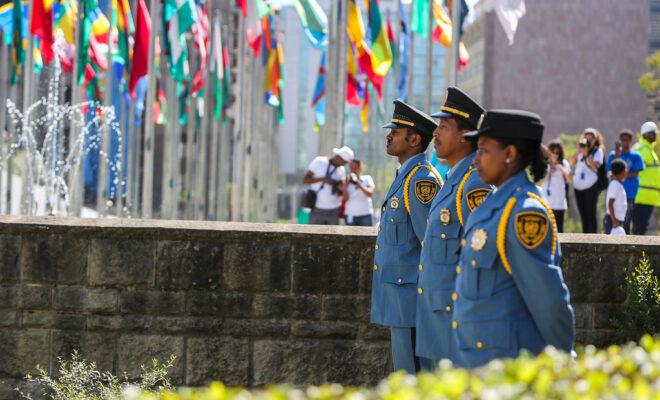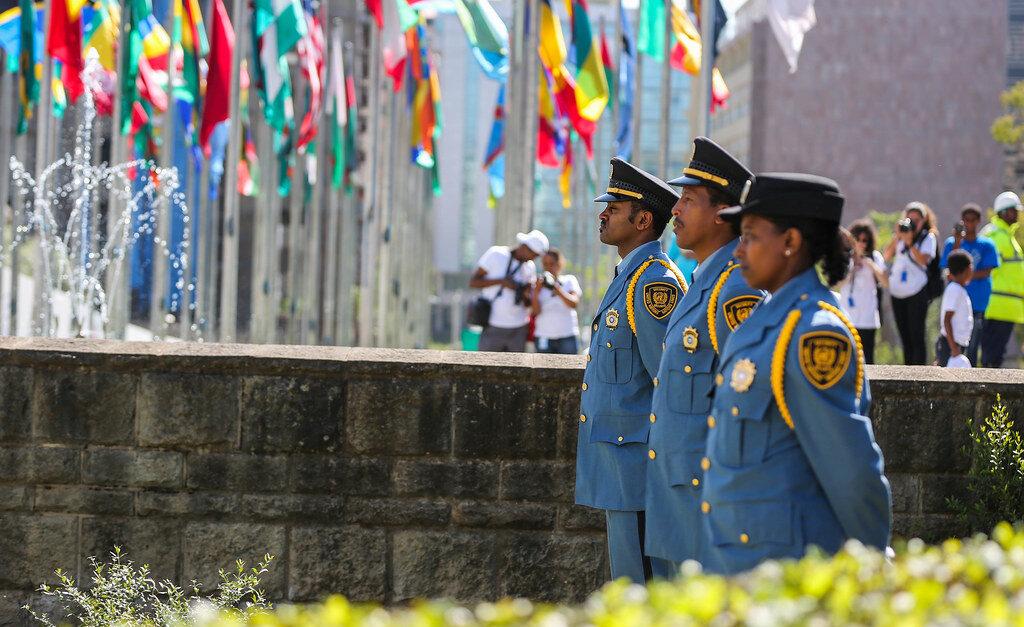Why the Tigray investigation should be conducted by the UN, alone

Any probe into war crimes that involves the AU or the government’s own human rights commission stands little chance of being effective.

Security officers at a UN flag raising ceremony in Addis Ababa. Credit: UNICEF Ethiopia/2015/Zerihun Sewunet.
Since 4 November, soldiers from the Ethiopian federal government, Amhara regional state, and Eritrea have waged a coordinated war in Tigray. For months, the region has been under a telecommunications blackout with journalists’ movement severely restricted. Nonetheless, reports continue to emerge of massacres, rape and ethnic cleansing. Humanitarian access has also been blocked, denying millions of civilians in need of assistance.
Given the apparent scale of the gross human rights violations, European Union, US and UN agencies among others have been calling for an international investigation. The Ethiopian government first resisted this pressure, but eventually came up with a questionable proposal. It called upon the African Union (AU) to investigate human rights abuses together with the Ethiopian Human Rights Commission (EHRC), a government agency.
In a surprising move, the Ethiopian government then also invited the UN Commissioner for Human Rights to jointly investigate, which was accepted. It remains unclear whether the UN’s acceptance now means the AU’s involvement has been annulled or what exact arrangement is being planned. What does remain clear, however, is that any investigation in Tigray that involves the AU or EHRC stands little chance of being legitimate and meaningful.
Un-independent arbiters
When the war against the Tigrayan Regional Government began, it quickly created a major humanitarian crisis and insecurity that threatened to destabilise the entire region. The need for AU action was clear, yet the Chairperson of the African Union Commission, Moussa Faki Mahamat, displayed no interest in intervening. In fact, a month and a half into the war, he declared that: “In Ethiopia, the federal government took bold steps to preserve the unity, stability and respect for the constitutional order of the country, which is legitimate for all states.” With this stance, he not only displayed partisanship and a disregard for the civilians caught up in the fighting, but he also undermined the peace efforts embarked upon by AU Chair, President Cyril Ramaphosa of South Africa.
One reason for the AU’s bias may have been the international influence and diplomatic capital that Ethiopia has built up, ironically mostly during the time when the Tigrayan People’s Liberation Front (TPLF) dominated the government. Another factor may be the undue influence accorded to Ethiopia due to the fact that it hosts the AU headquarters in Addis Ababa.
The EHRC is widely regarded as being similarly compromised. It is nominally an independent state organ, but many Ethiopians see it as biased in favour of Prime Minister Abiy Ahmed’s administration. One reason for this is that its reporting has often been selective, targeting cases that reinforce the government’s narrative. For example, it took the EHRC only a few days to send a team to the Tigrayan town of Maikadra to investigate allegations of a massacre in November 2020. About a week later, it released its preliminary report which attributed responsibility to Tigrayan fighters. In doing so, the EHRC ignored or discredited witness statements from numerous refugees in Sudan, reported in several news agencies, who claimed that Amhara militias had also committed massacres in Maikadra.
The EHRC has been much slower to investigate many other reports of massacres in Tigray. Although it did recently release a preliminary report regarding “grave human rights violations committed in Aksum” and pointed the finger at “Eritrean soldiers”, these findings came nearly four months after the November attack. Notably, its statement also came just the day after Abiy acknowledged publicly for the first time that Eritrean forces were indeed operating in Tigray, after denying it for months.
Why a UN-led investigation is needed
Most Tigrayan political parties and the President of Tigray Debretsion Gebremichael have made it clear that they wouldn’t consider a probe into the war led by the AU or EHRC as legitimate. They expect that any such effort would be unduly influenced by the Ethiopian government and serve as a way for the state to cover up, rather than expose, war crimes.
Impartiality – and the perception of impartiality – must be a key part of any human rights probe if it is to meaningfully investigate and pave the way for justice, accountability, and reconciliation. In the case of Tigray, this means that the task can only be entrusted to an international body that is seen as neutral and commands the trust of all the actors.
There is a practical element to this too. An investigation involving the AU or EHRC would struggle to secure cooperation not only from the parties to the conflict but many witnesses and victims. Moreover, it is likely that only an international body like the UN would have the authority and independence to be able to navigate such a complex conflict with such a wide range of actors that includes Eritrea and sub-regional ethnic militias. Investigators will not only need to shed light on atrocities in a context in which almost all allegations are being denied but make sense of the deeply historical drivers of the conflict, which will require the analysts to be detached from politics.
A UN-mandated and -led investigation is the closest we can get to such a feat. And the International Commission of Inquiry on Darfur may be a good blueprint. The alleged atrocities are similar and some parallels can also be drawn regarding parties to the conflicts.
It is promising that Ethiopia invited the UN to join the investigation in Tigray. However, if the probe is to be effective and legitimate, the UN must now insist that it is conducted by only its officials – working independently, impartially, and without the intervention of any third party.





Its worth reading this article.
To add more the Ethiopian human rights commission only reported #axum massacre and #maikadra …there are many left like dengelat,bora selewa, debre abay massacres which is an irony while the international media ,human rights watch and amnesty international have reported with evidence, the Ethiopian human rights commission was asleep knowingly, thats why we are claiming UN led investigation.
This is nothing more than a plea to the “white saviour”. What a colonized mentality! Get a help.
the unite nation is a scam for the Europe union…stop letting the Europe union control the problems of mother/africa.
this is not a free papers
Fri tigray
The AU has no experience nor the capacity to handle the crime investigation and I fully agree with the authors opinion.
There is no trust embodied in the organisation by African communities and as it now stands it is a symbol of no significance.
The UN has enough expertise and experience to handle the investigation as a neutral body and it also has acceptance by the international community.